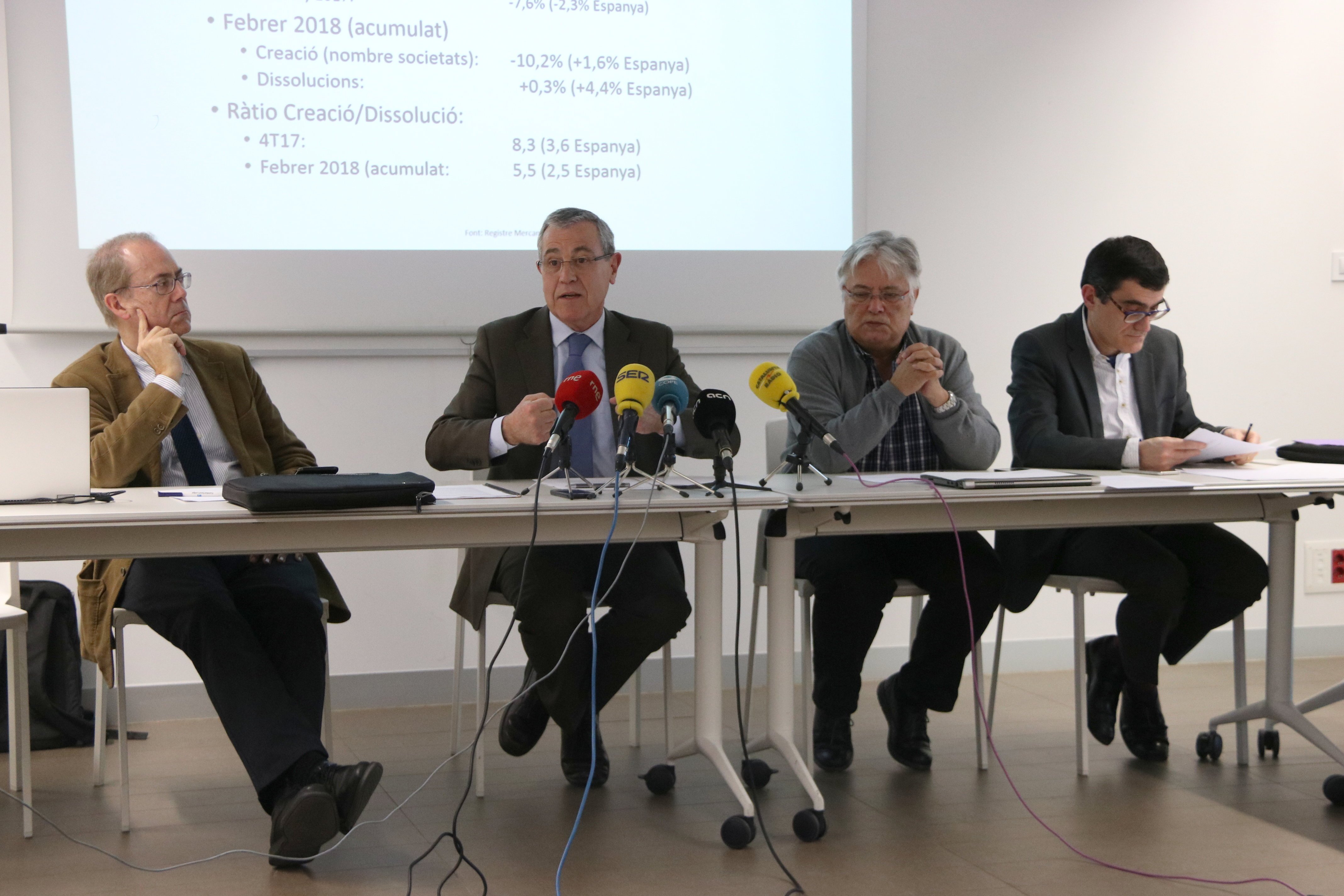The College of Economists of Catalonia has today presented a report on the general state of the Catalan economy, emphasising the effects of the central government intervention in Catalonia on the public sector, describing it as "a paralysis which has done harm and created an administrative collapse". Nonetheless, the speakers at the release press conference say that the Catalan economy continues to grow, generally at a higher rate than Spain.
Catalonia's GDP grew up to 3.9% in the last quarter of 2017. Predictions for 2018 put it around 2.6%, lower than last year but, according to economist Xavier Cuadras, this is due to normal cycles. "We're in a sweet period, even taking into account where we're coming from and the level of unemployment we have, at 12.5%, with 16.5% in Spain, which in any advanced country would be a scandal. We're intensely jolting back and forth: we don't know how to grow".
Article 155 has "very negative" effects
Economics professor and member of the Commission on the Catalan Economy, Albert Carreras, made special reference that the intervention in Catalonia through article 155 of the Spanish Constitution, has multiplied the bureaucracy and time needed to do things. Every move, however small, has to be justified and that "will surely be a setback for payments".
For his part, the economist Jordi Goula wanted to emphasise that "it's not true what they say about [article] 155 supporting the Catalan economy, rather it's the opposite". Goula says that the intervention "implies a check on activity and agility". The College says that the measure "has a small influence on the important statistics of the Catalan economy, but does affect things less readily visible" and that workers have to deal with bureaucracy instead of their real roles. They believe it should therefore "be stopped immediately because it has no justification".
Consumption, tourism and real-estate
According to statistics from Comertia, consumption in Catalonia dropped during October last year. Goula says that this drop was in response to the violence on 1st October, the day of the referendum, followed by the strike on 3rd October and the particularly warm weather seen that month, meaning consumers weren't inspired to buy winter clothing. In any case, he says it was limited to that one specific month, and that the economy has now recovered. One statistic showing this is the registration of new cars, which keeps growing.
Tourism, on the other hand, fell during the final quarter of 2017, but January's numbers show a clear upwards turn. Specifically, the growth of tourism from abroad has been between 2 and 4% whilst, more importantly, spending by tourists is up 11%. The results of the last three months of 2017 could be attributed, he said, to the fact that "violence in the streets scares" people, referring to the terror attack in Barcelona on 17th August.
The real-estate market has few statistics, and they are released late. In any case, sales in Catalonia remain stable, but prices are starting to slow down a little.
"Strong" business fabric
In terms of business, Modesto Guinjoan, doctor in Economics, explained that "the financial crash left corpses of many companies, but the ones that remain have pure musculature, a strong business fabric, competitive and have bet on innovation". As such the productivity levels they're achieving make for a much more competitive sector. He also noted the efforts towards internationalisation, something they believe "is very notable and very positive".
16,939 businesses were created in Catalonia in 2017, 23.8% of all those created in Spain. On the other hand, 1,977 were closed, with Guinjoan assuring that "dissolutions in Catalonia are stable and on the other hand in Spain they're growing more". In fact, in Catalonia in the fourth quarter of 2017, 8.3 businesses were created for every one closed, in Spain that number was only 3.6.
Guinjoan said that these dissolutions are closely linked to stable facts, and that it's more important to look at the strong internationalisation of Catalan businesses and the area of exports, "in which we go from record to record". On this subject, he noted the Port of Barcelona's results.
The Catalan economy, "in a sweet period"
As a general evaluation, the College say that "we're in a sweet period". The numbers show that "we maintain a good level of sustained growth, which continues to create jobs [and] that the business system is creating competitiveness", but that reference must also be made to the exceptional situation of the public sector, "which might not give enormous economic consequences, but is disfunctional". Guinjoan also referred to the Financial Times describing Catalonia as the most attractive region in southern Europe for investment.

